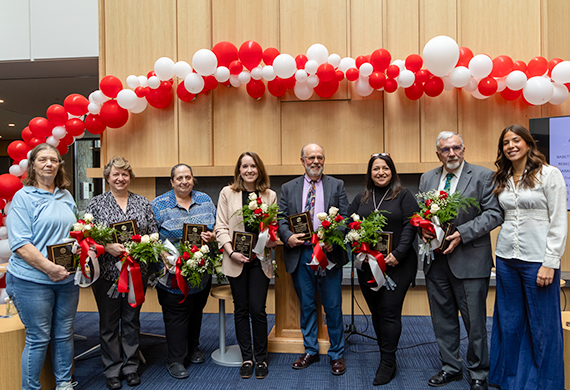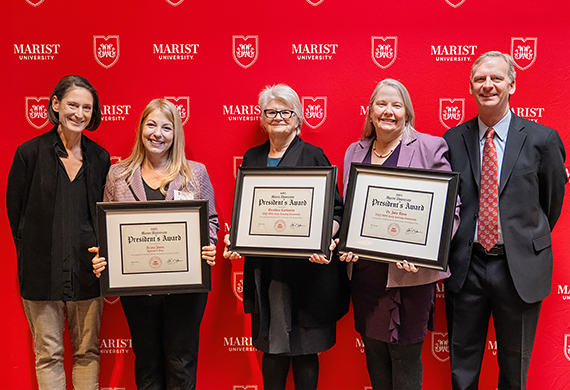New Books From Marist Authors
January 23, 2020—Marist faculty have recently published a wide variety of books: an environmental studies anthology, a history of media criticism, a novel, and a tool for educators on how to use games in the classroom.
When Associate Professor of Environmental Science Rich Feldman was asked to put together an anthology, he knew immediately that he wanted to explore some connections between biodiversity and climate. Why? “I believe strongly that these two subjects deserve more understanding by students, as well as by the public. I looked for such a book for an honors course two years ago and had no luck.” Feldman served as the editor for Biodiversity and the Climate Crisis and wrote an introductory chapter on biodiversity, plus the introduction, conclusion, and chapter questions. All the chapters selected for the volume have been published within the last seven years, so the book represents recent thinking and research. Although it’s intended for an academic audience, Biodiversity will appeal to anyone who’s interested in the environment. “Just look at the current bushfires in Australia and the devastating harm to wildlife there. It’s apparent how these topics are linked,” said Feldman.
Feldman also plans to use the book in his new course, “Biodiversity and Conservation.”
The book is published by Cognella and available at cognella.com.
Assistant Professor of Journalism Kevin Lerner is a working journalist, but his area of scholarly inquiry has been centered on the history of journalism through the lens of criticism and satire. His book, Provoking the Press, takes a sharp look at [MORE], a 1970s magazine that put a critical eye on the media.
“All working journalists in the 1970s knew [MORE],” Lerner explained. “It was the most fun you could have in journalism at a time when journalism seemed like the most fun thing you could do.”
The magazine had a very small staff and kept little in the way of files and memos. So, Lerner had quite the research job in putting together his book. He spent years poring through old issues of the magazine and seeking out notes about it kept by editors of the New York Times and Washington Post. “They all kept files about [MORE] because it made them angry—I found those in the New York Public Library’s archives.”
Lerner also relied on oral history, interviewing people associated with [MORE] to get at the full story.
[MORE] was published during a critical time in U.S. history—Watergate and the resignation of President Richard Nixon. “There was a real crisis of conscience in American journalism,” said Lerner. “The founders of [MORE] thought the concept of objectivity was silly—and unachievable.”
The research feeds directly into Lerner’s work as a teacher. “The thing I like most about teaching journalism at Marist is that we’re a small pre-professional program. What you get here is the basics of journalism rooted in the liberal arts. You’re going to understand how to be critical of the world,” he said. “This kind of self-criticism is going to help my students figure out what the next kind of journalism is going to be, not just get their next job.”
The book is published by the University of Missouri.
Joe Zeppetello, Senior Professional Lecturer in the English Department, is a published novelist who teaches creative writing. His new book, These Truths, is a time-shifting, genre-crossing novel that imagines a world in which the key line of the Declaration of Independence (“All men are created equal”) was not written by Thomas Jefferson but by an escaped slave who became captain of pirate ship.
Zeppetello drew inspiration for his story from history (notably, the well-documented fact that Jefferson fathered children with one of his slaves, Sally Hemings) and from more recent events, including a professor who was fired for criticism of U.S. foreign policy following the 9/11 terrorist attacks, and the #MeToo movement. The novel’s protagonist is an English professor who makes the discovery about the Declaration and eventually stands trial for bringing the news to light.
“I wanted to explore how you can speak the truth but still be punished for it,” said Zeppetello, who plans to do readings in the region this spring.
The book is available on Amazon.
Karen Schrier, Associate Professor and Founder of the Games and Emerging Media Program, is a leader in looking at games as learning tools. For her third volume in the acclaimed Learning, Education, and Games series, she decided to focus on a key need. “I was often fielding inquiries from educators and parents about which games to use for a specific purpose,” said Schrier. “People wanted concrete recommendations, so I decided to make this book as a reference. If you’re looking for effective games to teach STEM, history, or languages to college students, for example, you can find it here.”
Learning, Education, and Games, Volume 3 includes profiles of 100 games. Schrier sought to include a wide variety of games: some are free, some are very well-known, some are digital, and some aren’t. For instance, the book includes games such as Call of Duty, Chutes and Ladders, Fortnite, the Sims, and World of Warcraft. Each chapter explores a single, specific game—along with a short synopsis of the game and how it was actually used in a classroom by an educator. The book can be downloaded for free—making it an especially accessible resource for educators.
Four of Schrier’s Marist students contributed to the book: Francesco Galletti ‘18, Finn Geer ’19, Faith Matthew ’19, and Ben Pousada ’18. Schrier also brought in a host of other contributors representing 18 countries—everyone from game designers to classroom teachers to academics. “I really wanted to think about this book in a global way,” she explained.
Learning, Education, and Games, Volume 3 is published by Carnegie Mellon University ETC Press.



